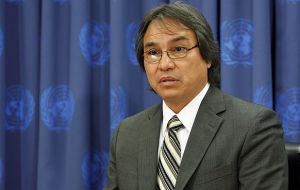MercoPress. South Atlantic News Agency
UN calls on Argentina to stop eviction of indigenous peoples from their lands
 The usurpation of indigenous lands is common practice argues Special Rapporteur on Indigenous Peoples, James Anaya
The usurpation of indigenous lands is common practice argues Special Rapporteur on Indigenous Peoples, James Anaya United Nations Special Rapporteur on Indigenous Peoples, James Anaya called on Argentina to cease the eviction of indigenous communities from their lands, during the presentation of the annual report of his office before the UN Human Rights council in Geneva.
The report requests “the suspension of all process and administrative actions to evict indigenous communities from their lands until a full technical-juridical procedural survey of lands occupied by the indigenous peoples is completed”.
“The grave legal insecurity in indigenous lands has been reflected in the high number of indigenous communities’ evictions” points out the report elaborated on data collected by Anaya during a mission to Argentina in 2011. Anaya and his staff besides Buenos Aires City visited ten of the 23 provinces and completed 170 testimonies.
The Argentine delegation replied that under the current Emergency Law, (26.160) evictions from these lands has been suspended until 23 November 2013, but admitted that “after verifying the absence of the requirements demanded, there have been evictions”.
Argentina’s ombudsman office supported the report saying he “continues to receive” claims from members of the “Mapuche community Lof Paichil Antriao in the province of Neuquén, the Qom people of Formosa, the Omaguaca people of Jujuy and the Wichi from Salta”. They all claim that the Emergency Law is not being complied.
The head of the Argentine NGO Human Rights Standing Assembly, Rodrigo Gomez Tortosa has been quoted saying that the emergency law has “a very low degree of compliance” and accused the authorities from the northern province of Formosa for “the threats and aggressions suffered by the indigenous leader from the Qom community, Felix Diaz, who is in litigation “over the usurpation of land by provincial officials.
According to official data the indigenous population totals 600.329, which is equivalent to 1.7% of the 42 million Argentines, although other sources mentioned by Anaya estimate the number closer to 2 million made up of 30 autochthonous peoples, settled mainly to the north and south of the country.
The problems of Argentina’s indigenous stems from the “historic de-possession of vast tracks of their lands by ranchers and the big farming, oil and mining corporations which operate in the lands claimed by these communities” which lack “a legal acknowledgement of their lands according to their forms of use and occupation” concludes the report presented by Anaya.




Top Comments
Disclaimer & comment rules-

-

-

Read all commentsBut...but...it's what the country was founded on, they can't stop now!!
Sep 19th, 2012 - 04:54 am 0Guzz whats your thoughts on this story?
Sep 19th, 2012 - 05:22 am 0Well they must do this, the UN has said they must....surely they can't ignore the UN while calling on others to comply with it? That would be double standards and Argentina doesn't have those. Does it?
Sep 19th, 2012 - 06:14 am 0Commenting for this story is now closed.
If you have a Facebook account, become a fan and comment on our Facebook Page!